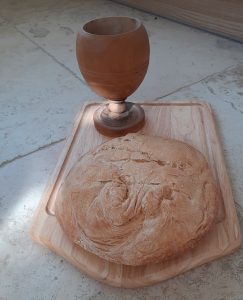We will all remember the year 2020. Never, in our lifetime, have we experienced global focus on one unseen, yet very present danger – Coronavirus. To begin with, we watched our tv news in growing disbelief as we saw other countries battling the disease, turning to lockdown, their bustling cities becoming like ghost towns, empty and strangely bleak. There was a sense that this could not – would not- touch us, here in the UK, and then the slowly growing realisation that, yes, it was coming and there was nothing we could do to stop it. There followed a sense of determination that we would ‘beat’ it, only to be replaced by a dawning comprehension that this was huge, that we were all in this together, and that it could only be through a united effort that we would have any hope of coming through this pandemic without hundreds and thousands losing their lives.
And so, our ‘normal’ became staying at home; by so doing, we were told, we would be saving lives, preventing our NHS from complete overload and would be protecting ourselves and our loved ones as well as our fellow countrymen and women.
A strangely inactive way for the majority of us to save the world! Social Media became flooded with wise and witty sayings and pictures as the British people hunkered down; the ‘underclasses’ were suddenly propelled into the limelight as ‘key workers’, those without whom our society would collapse; cleaners, waste collectors, shop keepers, delivery drivers, teachers, carers, healthcare assistants, therapists as well as nurses and doctors and other personnel and technicians working within the NHS.
Major companies had to lay off staff, but many were eager to offer what help they could, and so we saw car manufacturers adapting to produce vital equipment for our hospitals, school IT departments making protective masks, companies offering use of their buildings to be adapted as hospitals, the army fighting the virus rather than the more regular combat of war. Local communities came together, forming WhatsApp groups to offer support and friendship to each other, neighbours dropped notes through doors, offering help and assuring those in need that they were not forgotten, hundreds of thousands volunteered to help and support local services and food banks. Even local councils took on responsibility to house and feed the homeless. People stood at doorways clapping to show support for NHS workers, they lit candles to reiterate the hope that lay deep within; some streets organised ‘social distance dancing’ every morning, churches signed up to holding ‘live streaming’ and ‘virtual’ services and shared virtual coffee fellowship and much, much more., Within the darkest times, God’s image shone from the people He had made.
As I write this, we are in the third week of ‘shutdown’ which also happens to be Holy Week. One of the things I have been faced with on a personal level through these past weeks, is my own perceived need to be busy. Like many of my contemporaries, I ask, “What do you do?” rather than, “What interests you?”, “What is important to you?”, “What do you look forward to?” It took me at least the first week to even begin to slow down; to enjoy the luxury of ‘living in the moment’ without feeling guilty or rather nervous about having nothing to DO.
Social Media tells me that many of my fellow ‘Shutdowners’ turned to traditional ways of filling in the time, and I joined them in achieving a long-held desire to make sourdough bread. I have to say that my first attempt wasn’t exactly shop-bought standard, but I have improved, and we are now enjoying some very tasty bread and baked good – cinnamon swirls, pizza, ciabbata. Currently I have hot cross buns resting on the kitchen side, ready for baking tomorrow, Good Friday. As I have worked with this new (to me) method of baking, I have learned some of the joy of slowing down. I have realised that God deliberately wrote REST into His timetable for the world in a bid to help us to relax, to be renewed and to really engage with His world, to really see Him at work in and through His creation.
The sourdough ‘starter’ needs to be fed in order to stay fresh, active and useable. This speaks to me of our need for spiritual food if we are going to be useful in God’s service. Again, this period of enforced not-rushing has given me time to dwell in God’s word. At the beginning of Lent, I picked up a suggested Bible reading plan from my daughter’s church which took us through the Book of John as a Lenten discipline. Some days, the readings have only covered a very few verses; I thought I would find this difficult but I have been really blessed through meditating on short passages of Scripture, putting myself in the passage and imagining what it must have been like to be a witness to the incredible truth of seeing Jesus, God-in-Man, go about His ministry. In those quiet times I have met with Jesus, God-with-me, in a new and precious way, and all because I have slowed down and taken the time to spend with Him, time that He always offers but which I have so often hurried past.
The dough develops slowly. It takes little kneading but long periods of rest. During those resting times, bubbles appear as the dough rises and expands. This speaks to me of the unseen work of the Holy Spirit. As we allow Him to work in our lives, He will lighten our days and will grow us to become what God has always intended us to be. Sometimes the dough is taken, and shaped, and then left to rest again; just as those times when we feel that God’s Spirit is changing and shaping us, and we learn to rest in the security that He is doing something good in us.
Of course, all bread has, at some point, to be baked. The heat of the oven mysteriously converting a gooey, bland looking substance into something nourishing, tasty and which smells wonderful. Spiritually we could align the baking in the oven with difficult times through which we pass – such times, perhaps, as those arising from the Coronavirus pandemic – times when we might echo Jesus’ cry of ‘My God, my God, why have You forsaken me?’ yet, as we bring the wonderfully fragranced, fresh bread out of the oven, we can hear his loving reply, “This was for your good, so that you may share in My holiness.” (cf Hebrews 12:10b)
My overriding prayer is that we, as humankind, will learn from this that each one is precious; that all people should be treated with fairness, justice and mercy. That we, in the rich countries have an obligation to our brothers and sisters in underdeveloped lands, to ensure they have clean running water, and access to good health care, and enough food and..and..and. I pray that we, as His followers, will be moved to live as Jesus taught us and so to share in His holiness which was perfected through suffering and serving.
“You are a chosen people, a royal priesthood, a holy nation, a people belonging to God, that you may declare the praises of Him who called you out of darkness into His wonderful light….Live such good lives …that they may see your good deeds and glorify God on the day He visits us.” (1Peter 2:9-12)
Jesus says to each one of us; “Come with me by yourselves to a quiet place and get some rest.” (Mark 6:31b) “Learn from Me, for I am gentle and humble of heart and you will find rest for your souls.” (Matthew 11:29)

